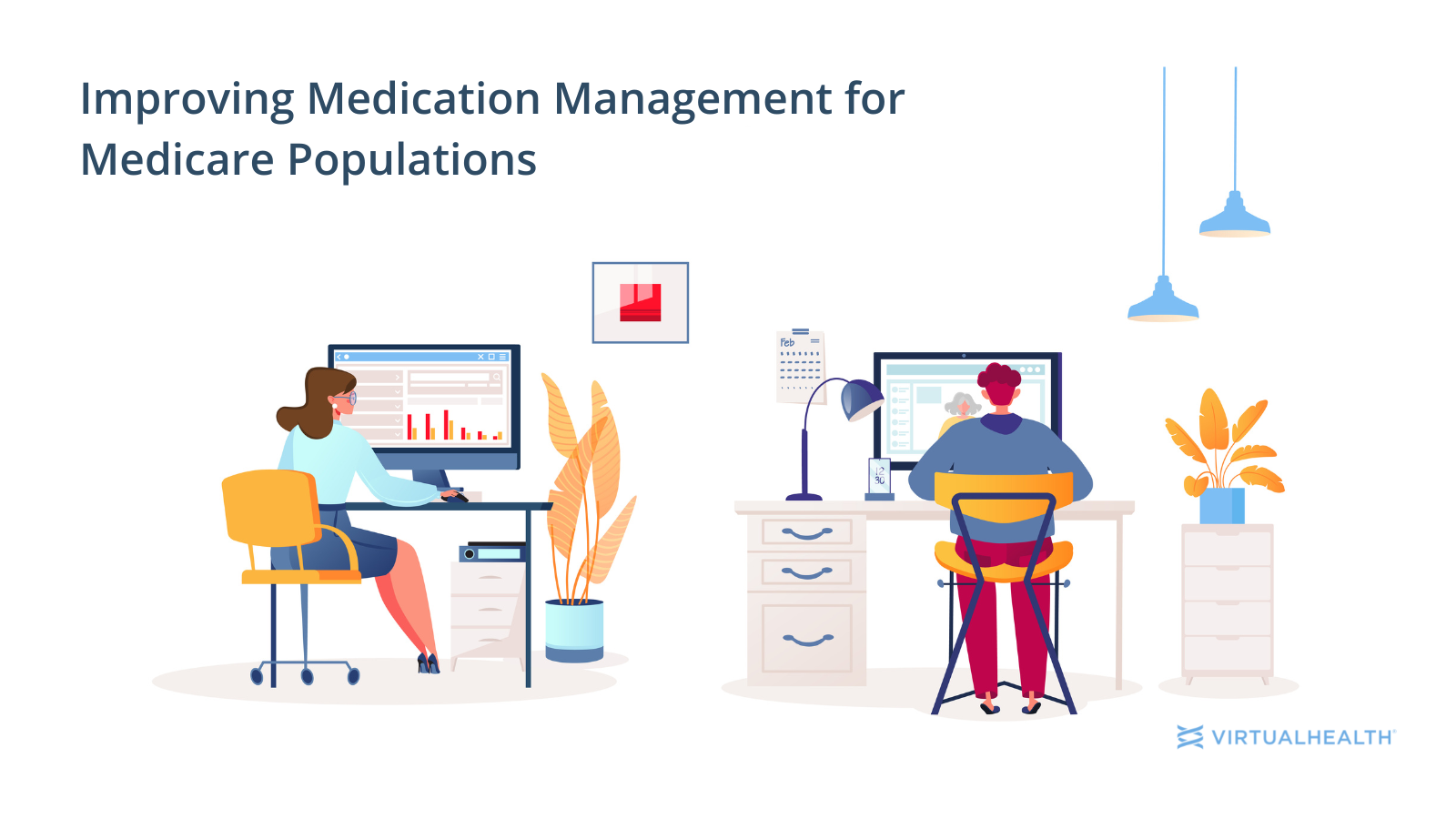This is the second article in a six-part series exploring ways to improve the delivery of whole-person, value-based care to Medicare and Medicare Advantage populations. In this post, we explore ways that healthcare organizations can empower care teams to ensure safer medication management practices. You can also download our white paper Effectively Managing Medicare Populations: 6 Focus Care Areas to get more information and insights.
Medication Management Risks Specific to Elderly Care Populations
Ensuring safe medication practices is critical to overall patient safety, quality of life, and health outcomes – especially for older members who may need extra support managing their medications as well as remembering to take them.
Elderly populations are exposed to a variety of risks when it comes to medication management including:
- Polypharmacy. Many Seniors take more than one medication prescription and/or over-the-counter medication. In fact, approximately half of adults aged 65 and older take five or more nonprescription and/or prescription medications per week. This can increase the likelihood of error, and of adverse drug events. Falling is a particular concern among elderly patients and one that can be more likely if a medication (or lack of medication) results in dizziness, lethargy, or imbalance.
- Age-related health factors. Seniors are more prone to chronic conditions such as high cholesterol, high blood pressure, diabetes, and arthritis- and oftentimes have multiple comorbidities with a complex medication regimen.
- Social determinants of health (SDOH) challenges. Some SDOH that affect medication management in senior populations includes economic instability, transportation insecurity, and low health literacy. It’s much harder to adhere to prescribed medications if co-pays are too high, if you can’t drive to a pharmacy, or if you aren’t able to understand dosage or administration instructions.
- Difficulty with activities of daily living (ADLs) and instrumental activities of daily living (IADLs). Aging health populations overwhelmingly experience difficulty with one or more ADLs/IADLs. Medication management – defined in the context of ADLs as the ability to obtain medications and take them as directed – is a common ADL that elderly individuals need assistance with.
H2: Medication Management of Medicare Populations for Care Managers
Medication management is a critical part of healthcare. While providers have to be cautious of misdiagnoses, drug therapeutic failure, and adverse reactions, care managers can help solve other at-home medication management and provide much-needed support.
Care managers are best situated to help improve medication management in the following ways:
- Helping to ensure that patients take the right medications at the right time
- Identifying and addressing barriers to adherence
- Educating patients about their medication regimen
- Noting and helping resolve any drug or drug device-related problems
- Working collaboratively with other clinical care team members to report potential issues like duplicate therapy, contraindications, and adverse events
H2: How HELIOS Helps with Medication Management
A medical management platform with intelligent processing and analysis capabilities can empower both care managers and members to better manage medication processes.
For care managers, a platform like HELIOS can help lift administrative and mental burden around medication management. Automated reminders and medication information updated in real-time reduce the need for care managers to manually search through records, or to depend on their own memories for vital information on individual members’ regimens.
Boosting Medicare plan member engagement and motivation regarding safe medication management, usage, and adherence. HELIOS’ built-in education resources and telehealth tools can help care managers work with Medicare plan members to better understand medication instructions, obtain prescriptions on time, and proactively reach out to resolve questions and concerns. They’re also a good way to provide virtual support and check-ins for members who may be without caregivers or who need more frequent and personalized help.
Here’s a more detailed look at other HELIOS capabilities and tools that help support medication management for Medicare populations.
- Notifications for medications.Automated alerts to notify care team members when there is a potential issue with a medication that has been added to the member’s regimen, such as drug allergy or drug-drug interaction, or when medication reconciliation might be due.
- Easy-to-read overview of member medications. A centralized member profile provides an at-a-glance view of a member’s medication regimen (prescriptions and OTC). This allows members across the care team to quickly access the reconciled medication list and identify or note any potential issues, obstacles, or changes that may need to be communicated, or opportunities for patient education.
- Better inform patients about their medications. Educational resources (videos, flyers, and more) integrated into the HELIOS platform can help boost medication adherence by better informing patients about their medications, how to take them, and why adherence is so important.
- Integrations with pharmacies. Link members with pharmacies that offer enhanced services such as blister packaging, medication syncing, home delivery, medication review, reconciliation and adherence coaching, etc.
Telehealth tools to check in about medications. Multiple communication channels within HELIOS (HELIOStext, HELIOSvisit) allow care managers to connect more frequently with members to check in on medication adherence and answer questions.
Learn More About How to Improve Medicare Population Health Management
Check out the other five posts in this series to see how to improve medication adherence and outcomes for members who need additional support and services.
- How to Improve Care for Members with Medicare Who Need Long-term Services and Supports (LTSS)
- How to Integrate Behavioral Healthcare for Medicare Members
- How to Improve Chronic Condition Care Management
- How to Better Address SDOH for Medicare Members
- How Can Medicare Payers Better Support Home Health Care?



